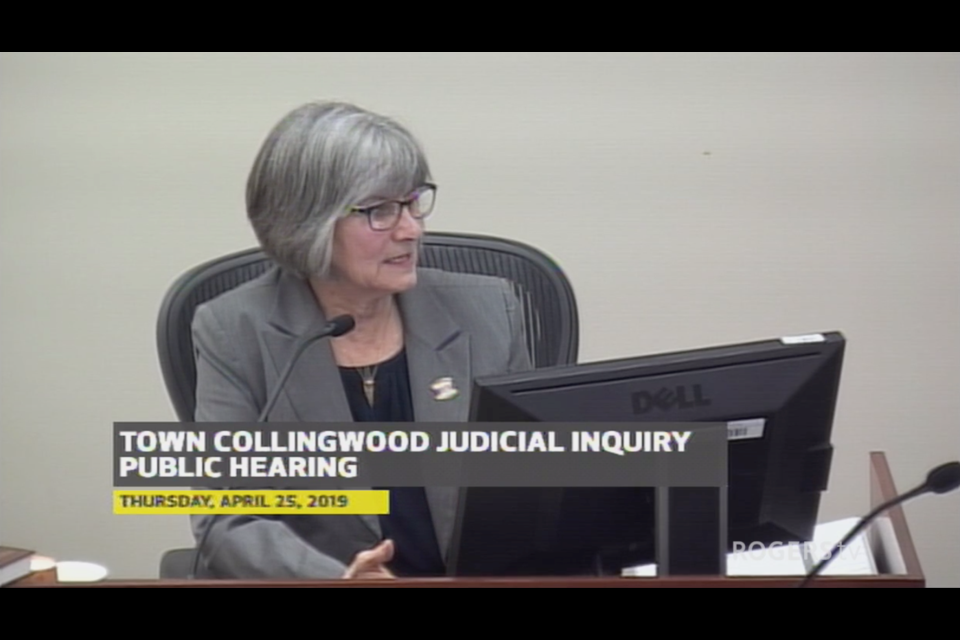COLLINGWOOD - “With the benefit of hindsight,” former mayor Sandra Cooper agreed with one lawyer’s suggestion her brother was involved “too much” in the process of selling 50 per cent of the town’s electricity utility in 2012.
Cooper said her brother was “perhaps” too involved in the sale after William McDowell, lawyer for the Town of Collingwood, asked her to think back over the foundation document and the evidence she’d seen in it.
As the judicial inquiry continued yesterday with cross-examination, Cooper faced more questions on her brother’s work with PowerStream during the Collus sale.
McDowell led the cross-examination yesterday.
Many of his questions centred on the retainer document between Compenso Communications Inc. (CCI) and PowerStream for Paul Bonwick’s services. Bonwick is Cooper’s brother.
The retainer, which Cooper said she hadn’t seen until it was revealed through the inquiry, was signed on June 7, 2011, and promised certain “deliverables” from Bonwick for PowerStream including the promise that Compenso would be “in constant contact with the municipal government leaders” for the purpose of intelligence gathering.
“So when you put all of that together, Mr. Bonwick is being paid because of his access to people like you. Do you see that?” asked McDowell.
“Yes, I do,” said Cooper.
“He’s being paid for his access to you personally,” said McDowell.
“To government leaders, yes that would include me,” responded Cooper.
Further into the retainer, a section entitled “disclosure” states “Bonwick agrees to make all necessary and prudent disclosures of his/CCI’s engagement with PowerStream” and goes on to say Bonwick has disclosed the scope of his services to the mayor and clerk of Collingwood.
“He was supposed to disclose the scope of his activities. He didn’t do that did he?” asked McDowell.
“Correct, that is right,” said Cooper.
Documents show Bonwick provided information such as summaries of other bidders' presentations, advance notice of the town’s valuation process, and insights from in-camera meetings.
While Cooper acknowledged she did receive “suggestions” from her brother, she maintained she did not pass on confidential information to him.
Regarding a document showing money paid (called extraordinary deductions) to Cooper and other board members following the sale, Cooper said that amount ($2,400 for her) was a total sum of per diem for her participation on the strategic task team.
Cooper said she believed there were bonuses paid to others following the transaction.
“It was explained to me that … in the business world that people are recognized for the work they have done,” said Cooper.
The next line of questioning came from Frederick Chenoweth, the lawyer representing former Collus President and CEO Ed Houghton.
Chenoweth suggested the sale of Collus wasn’t out of the blue, and that it was on the minds of Cooper and others who ran in the 2010 election because of Collingwood’s financial state at the time.
“The prospect of Collus changing … of the value of Collus … it was on the minds of you and on the minds of Collingwood councillors as early as the time of your election,” stated Chenoweth.
“Yes,” replied Cooper.
Chenoweth argued if it was on the minds of politicians at the time, it would also be on the minds of the people running Collus such as Houghton and the board chairperson, Dean Muncaster.
Michael Watson, the lawyer for Alectra (formerly PowerStream) launched his own cross-examination by painting a picture of a province-wide movement toward merging local distribution companies such as Collus to create larger electricity distributers to bring down the cost to customers.
Watson reminded the inquiry of Cooper’s 13 years on council before her term as Mayor and her four years of attending Electricity Distributers Association conferences annually prior to becoming mayor.
Watson suggested to Cooper she likely wasn’t surprised to learn Houghton met with PowerStream President and CEO Brian Bentz given the province’s policy toward Local Distribution Company consolidation, the state of the town’s finances, and her election platform of reducing town debt.
Cooper agreed.
Paul Bonwick also took his turn to cross-examine his sister.
He began with questions on the Municipal Conflict of Interest Act, which does not list sibling in the section about family members and conflict of interest.
Cooper replied: “If there is no direct or indirect pecuniary interest, then I would think that – I believe that I would not ask you for your information.”
Inquiry Counsel asked Cooper several times during the hearing on Tuesday and Wednesday why Cooper didn’t ask her brother more questions about his involvement with PowerStream.
“After the deal was concluded … did you feel that you had achieved a great result for the Town of Collingwood?” asked Bonwick.
“Yes,” responded Cooper.
Bonwick wrapped up his questioning by addressing the line of questioning from McDowell suggesting Bonwick was paid for his access to Cooper.
He reminded the inquiry of his experience on town council, on the local BIA, and as a born-and-raised local.
“Does it not make more sense that Mr. Bentz and PowerStream would rely on the fact that I’ve developed over 25 or 30 years of very broad network and a lot of relationships in the area not just specific to you?” asked Bonwick.
Cooper agreed.
The judicial inquiry continues on Tuesday, April 30 at 10 a.m. at the town hall council chambers. Former deputy mayor Rick Lloyd is next on the witness list. The hearings are open to the public and live streamed on Rogers TV. For transcripts and more details on the inquiry, visit the website here.
- CollingwoodToday.ca
